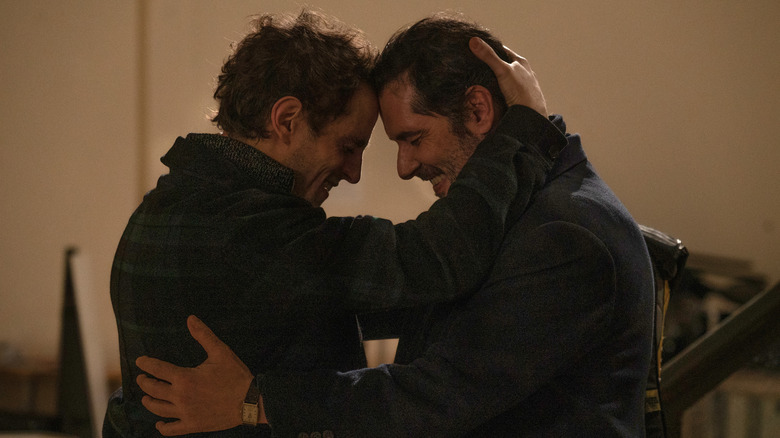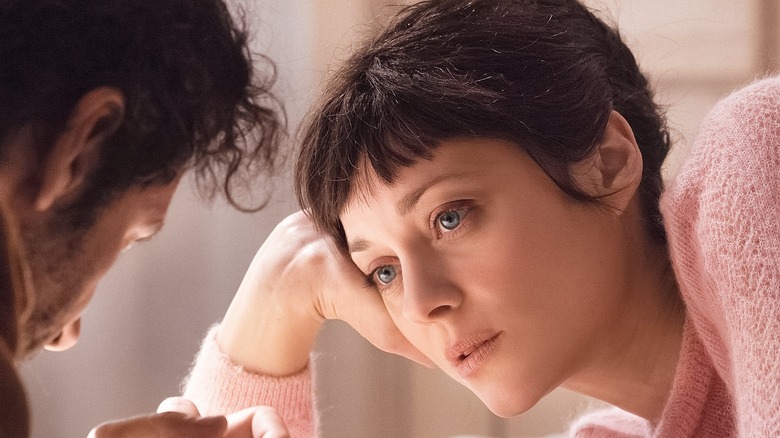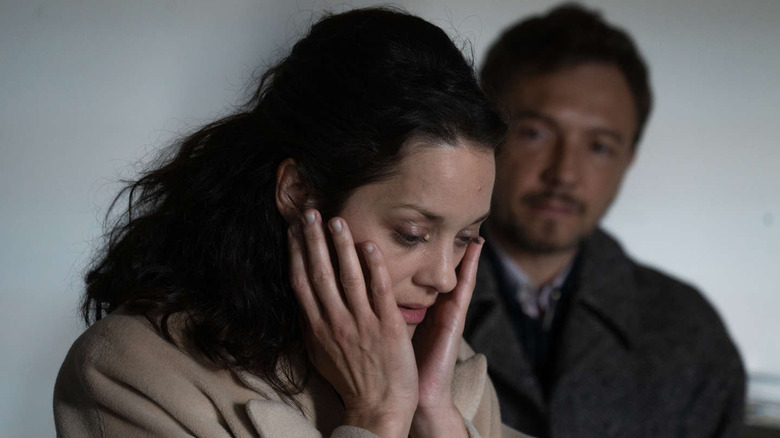Arnaud Desplechin On The Dissolution Of Hatred And Magic In Realism In Brother And Sister [Interview]
With a Cannes Film Festival slate filled with familial trauma, Arnaud Desplechin's "Brother and Sister" — also known as "Frère et Sœur" in France — fits in like a glove. The film follows two estranged siblings, Marion Cotillard's Alice and Melvil Poupaud's Louis, who haven't spoken to one another in over 20 years. But when their parents become victims of a brutal car accident, their sudden demises force the pair to reunite and take a hard look at the way their relationship has been fractured over the years. The film is an intense yet tender look at the complications that lie within the ties that bind us, and director Arnaud Desplechin is well aware of how deep those ties usually go. When the bond is deeper than one can comprehend, it can be ripe for misunderstandings and resentment. The rabbit hole can go pretty deep if one lets it, and Desplechin was clearly eager to show that side of familial life, as well as how to rectify that pain.
I sat down with Desplechin at the Cannes Film Festival to get deep about hatred, how to rid oneself of it, and the magical moments amid the realism of his newest film — and without a doubt, the filmmaker has a command of story and tone that allows him to play both within the lines and outside of them.
'My job is to save the character'
What keeps you coming back to the Vuillard family as your subjects for these films? They obviously have a long history in your filmography.
Was it planned or not? It was not planned. What was planned is that I made two adaptations, one of them being "Oh Mercy! (Roubaix Un Lumiere)," and the other being "Deception," the Philip Roth adaptation. So after that, I thought, no, no, no, I have to come back [and] acknowledge new material. I remember[ed] "The Christmas Tale," where there was already the same plot because you had this sister who was so full of anger against her brother, but I left Elizabeth on the balcony in Paris and she was melancholic. I thought, did I do my job as a filmmaker because I didn't save her, and my job is to save the character.
I said, "OK, let's switch." It's not Elizabeth any longer. It's Alice, and this time, I will save her. I will fix the defaults that we all experience in our lives. I will try to fix them a little bit because I think that's the thing that cinema can do, fix our lives. Our lives are imperfect, but when you look at the film, because it's done, because it's written, because it's shot, edited, et cetera, it's the life but seen with a better angle. And so, I could relieve that my character from this hate which is devouring her. And so, after that we said, but what will be the name of the family? [Co-writer] Julie Peyr told me, "Okay, let's go back to the Vuillard." The Vuillard knocked at my door and I just opened my door and they were back.
It's just really nice to see that kind of consistency in a filmography. I feel like you don't really see people going back and revisiting characters like the family. That stuff is just very cool. Why did you want to focus on hatred and ultimately the dissolution of hatred in this film? What about this is compelling to you as a filmmaker?
Because it's a feeling, because I think I confronted myself [with] my worst fear in life. The first one was not the hatred from Alice to her brother. My first fear is the death of the parents. The accident, the terrible accident, and the fragility of the parents. Lucky me, I'm so old and my parents are still alive. I'm still a kid. I'm not able to imagine their death. They have to be on Earth for the rest of my days. I'm not able to imagine that and say, "OK, I will confront myself with that." In real life, I'm terrified with the feeling. On so many levels—on the family level, but on the political level, on all the levels—I think that hate is a poison. I thought if we tell the story properly, if we shot it properly, if we keep an open mind, and a great and a large heart, perhaps we can find solutions to sort out that kind of bad feelings, which sometimes are poison to you, poison for Louis who is the object of the hatred; the poison for Alice, too, with loss and displace of her feelings.
Cinema is the best place to rectify that. The scene where Louis is flying — Where did you get the impulse to have such a magical moment in a film that's grounded in such realism? It was such a lovely little departure.
It's a rip-off. It's a rip-off. I have to confess, I am confessing in front of you. I think that there is a film — which is underrated in my opinion — but that I really love. It's "Alice." The name of Alice is coming from "Alice," the Woody Allen movie. At one point Alice is flying and visiting [her] husband. But this time [in "Brother and Sister"], it was not dealing with [a] ghost. So I thought, am I allowed to do that rip-off? Because [Allen] did it in such a wonderful way, I'm not allowed to do that. But I'm also a great fan of "Birdman." I thought, "OK, if I mix "Birdman" plus a memory of Alice, then perhaps I can make something of my own."
But now I will go to my deepest involvement in that scene, which is the fact that we hear during the film that Louis had a terrible relationship with his mother. They didn't get along. They were not friends. But I realized it during the mix. I didn't realize it before that the name of the mother is Marie-Louise, and the name of her son is Louis. In a way, the name of the mother is calling her son to come and to visit her and to grab her as a form of reconciliation at the end. To me, that justified this dreamlike sequence when he's flying all over Roubaix, arriving in Lille, and saying to his mother, "OK, our relationship was terrible, but I grab you. I hold you. I love you. I've been a fool. I've been a fool, you've been a fool. Who cares?" That was the beauty of it.
'I had to dare to plunge into that and to embrace that'
What was the most challenging thing for you in writing and directing this film? It's such a complicated film full of complicated emotions.
Obviously, the story of Louis too, with losing his child. Through the theme — and that there as a writer, and later on as a filmmaker — to dare to plunge into Alice's soul, and to share with her the fact that she's lost, that she doesn't know what she's feeling any longer. She doesn't know what [was] going through her mind as a child. She's lost in her memories. I had to dare to plunge into that and to embrace that, and to say, "I'm not judging you. I will be on your side and I will save you. I will save you from your bad feelings. I will set you free." And to do it not [in] a sugary way, that was the most challenging.
I [said] to Julie Peyr, the co-writer, "I don't want contrition. I don't like that. I don't want mellow scenes or sugary scenes. No, no, I don't want that. I want all my scenes brutal, but I want relief at the end of the movie." So to find a way from the bitterness of the opening scene to the absolute light of the final scene, that journey, it was a hard job to achieve.
It's interesting because when I interviewed Marion yesterday, she absolutely mentioned that you told her, "Please save Alice." I love hearing that again from you. If you knew Alice and Louis in real life or someone like them, what kind of advice would you give them about their relationship?
Something that I love in the film, it's a scene that I love. It was so important for the three of us, for Melvil, myself, and Marion to film that scene, the scene in the supermarket.
[I'd say,] "You don't have to love each other. You don't have to worship each other. You don't have to be tender or furious or whatever. Please just stumble on another human being and you realize that you like him or not, he's another human being. Period. You don't need dialogues." You see her [in the supermarket scene] and Alice's line is so funny. She's saying, "It's me," and that's it, and everything is sort[ed] out. That's the only advice that I could say. Please stumble on someone else. You hate him or you love him, it's not important. He's just another human being, so it's not that complicated.
What do you ultimately want the audience to take away from this story?
That you are not obliged to love, but you are not obliged to hate anyone. What you are obliged [to do] is to accept yourself at one point or another. Whatever the price is, you have to accept yourself. You have to have your two feet on the ground and lucky you, you are alive, you are not dead, so you have to be fully alive and to embrace the world. I hope that there is a movement in the film, because all the characters are trapped. The two characters are trapped. Louis is trapped in his parents' apartment. Alice is trapped in her hotel room. She's trapped on stage because she would love to be in the shadow and she has to be in the light. They are trapped in the hospital rooms.
Embrace the world. Go to Africa. Just embrace the world. Stop [being] trapped. You are not in jail. You are not in jail. That line the father [gives] to his daughter and he's so in love with his daughter, he's saying, "My dear, you are in jail." Then Alice laugh[s] and she says, "Please dad, set me free." The dad is unable to do that because parents can't do such things. But the film will be able to do that, to set her free.
"Brother and Sister" premiered as part of the 2022 Cannes Film Festival.


